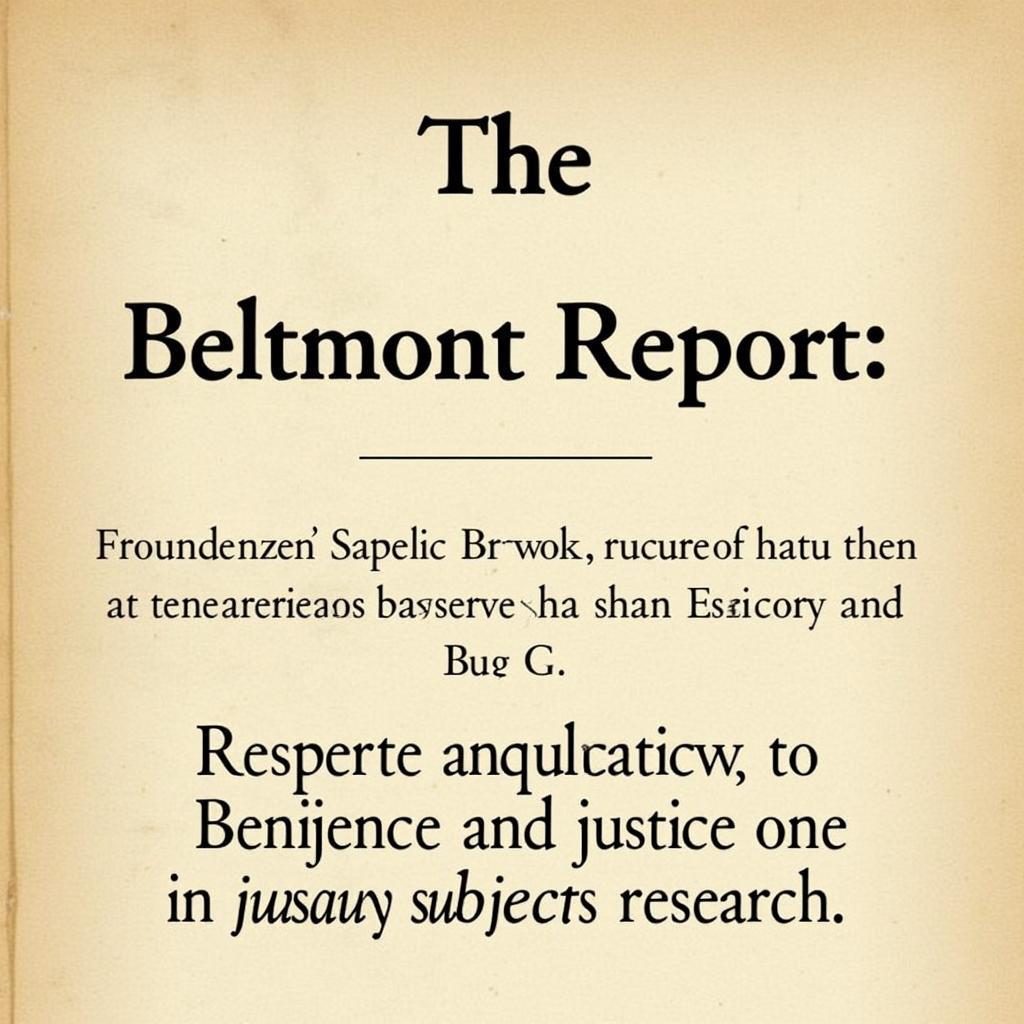The History And Ethics Of Human Subjects Research is a complex and often troubling subject. Understanding this history is crucial for ensuring ethical research practices today. From questionable experiments of the past to the robust ethical frameworks we have now, this journey highlights the importance of prioritizing the well-being and rights of all research participants.
A Dark Past: Unethical Practices in Human Research
The history of human subjects research is unfortunately marred by numerous instances of unethical practices. One of the most infamous examples is the Tuskegee Syphilis Study, where African American men with syphilis were deliberately left untreated to observe the disease’s natural progression. This egregious violation of human rights spurred public outrage and led to significant reforms in research ethics. The atrocities committed during World War II, including the Nazi medical experiments, further highlighted the urgent need for international guidelines. These events ultimately led to the development of the Nuremberg Code, a landmark document that established ten ethical principles for human experimentation. history of human research
The Nuremberg Code and Its Legacy
The Nuremberg Code laid the foundation for modern research ethics, emphasizing informed consent, minimizing risk, and the right to withdraw from research. While groundbreaking, the Code’s impact was initially limited. It wasn’t until later scandals, such as the Willowbrook Hepatitis Study, that its principles began to be widely adopted and incorporated into national and international regulations. The Willowbrook study involved intentionally infecting children with intellectual disabilities with hepatitis to study the disease. This, along with other unethical studies, underscored the ongoing struggle to protect vulnerable populations in research.
 The Belmont Report and its Guiding Principles
The Belmont Report and its Guiding Principles
The Evolution of Ethical Frameworks
Following the Nuremberg Code, several other crucial ethical frameworks emerged. The Declaration of Helsinki, adopted by the World Medical Association, built upon the Code and provided more detailed guidance for medical research. In the United States, the Belmont Report established three fundamental ethical principles for research involving human subjects: respect for persons, beneficence, and justice. These principles continue to guide ethical review boards (IRBs) in their evaluation of research protocols. The Belmont Report also addressed specific ethical challenges related to informed consent, assessment of risks and benefits, and the selection of research subjects.
participatory community research provides a valuable framework for ethical engagement.
Why is History Important for Ethical Research?
Understanding the history of ethical breaches in research is not just an academic exercise; it is a crucial component of responsible research practice. Studying these past mistakes helps researchers avoid repeating them and emphasizes the importance of upholding ethical standards in all research endeavors. It also allows for a more nuanced understanding of the vulnerabilities that certain populations face in research contexts and fosters a commitment to protecting their rights and well-being.
 Modern Ethical Considerations: Informed Consent and Data Privacy
Modern Ethical Considerations: Informed Consent and Data Privacy
Modern Ethical Challenges in Human Subjects Research
While ethical frameworks have significantly improved the protection of human subjects, new challenges continue to emerge. The increasing use of big data, genetic research, and artificial intelligence in research raises complex ethical questions about data privacy, informed consent, and the potential for discrimination. The globalization of research also presents challenges in ensuring consistent ethical standards across different cultural contexts. Navigating these evolving ethical landscapes requires ongoing dialogue, critical reflection, and a commitment to upholding the highest ethical principles in all research activities. citi human research certification
Conclusion: Protecting Human Dignity in Research
The history and ethics of human subjects research reminds us that scientific progress must never come at the expense of human dignity. By learning from the past and grappling with the ethical dilemmas of the present, we can strive to create a future where research is conducted ethically and responsibly, benefiting both individuals and society as a whole. the national research act of 1974 quizlet and guinea pigs in research provide further context.
FAQ
- What is the Nuremberg Code?
- What are the three main ethical principles of the Belmont Report?
- Why is informed consent important in research?
- What are some current ethical challenges in human subjects research?
- How can researchers ensure they are conducting ethical research?
- What is the role of an Institutional Review Board (IRB)?
- What are some examples of unethical research studies from the past?
Common Scenarios Involving Questions on History and Ethics
- Students researching for academic papers on bioethics.
- Researchers seeking guidance on ethical research practices.
- Members of the public interested in learning about the history of human subject research.
- IRB members reviewing research protocols.
Further Exploration
You might also find our articles on participatory community research and the history of human research relevant to your interests.
Need Help?
For assistance, contact us 24/7:
Phone: 0904826292
Email: research@gmail.com
Address: No. 31, Alley 142/7, P. Phú Viên, Bồ Đề, Long Biên, Hà Nội, Việt Nam.